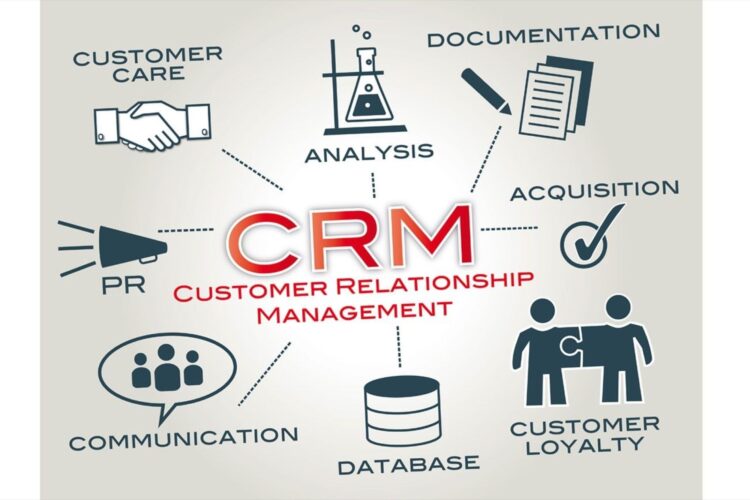CRM stands for Customer Relationship Management in real estate. In layman terms, CRM is a combination of all the processes, strategies and techniques that a real estate firm, business or agent uses to acquire and retain customers. It is done by analysing loads of data and requires a robust system for functioning well.
CRM systems can be acquired independently from companies like IXACT Contact which provide such services. Services like this are easily manageable and digitalises the process of connecting with one’s customers and tracking one’s customer relations. This in turn helps in better marketing and planning strategies to improve the real estate business. This makes the work of a real estate business much easier and faster. It is considered a great choice to invest in a good and experienced Customer Relationship Management system that has a prior and extensive knowledge of the market.
Page Contents
What does a Customer Relationship Management (CRM) System actually include?

Source: entrepreneur.com
A detailed and well put together CRM includes many details about consumer behaviour which then helps the firm decide where it should put its attention and which areas to work upon. Following is a list of things that are stored in a well-maintained CRM:
- Phone numbers
- Email addresses
- Addresses of the customers’ home and work
- Family Details: Information about spouse, partner and other family members
- Referral history
- Move-in date and related data
- Birthdays
- Details of the property and mortgage
- Details of communication history (including transaction details)
- Other contact details
- Deadlines and other Important dates
This information proves useful for real estate agents and companies who wish to expand their customer base, break out in the market and keep their customers engaged. Knowing about the customer and strategising one’s business plans based on that information is an excellent way to grow as a real estate agent.
What are the benefits of a Customer Relationship Management (CRM) System?

Source: enstinemuki.com
Besides storing and analysing data about the customers, below are a few other beneficial tasks that take place under the ambit of Customer Relationship Management (CRM):
1. Keeping records of issues in servicing and things to improve:
Not only is a CRM a mere database of customers’ information, it also includes the records of issues that a firm faces. This helps in better understanding of problems and thus helps in solving them.
2. Finding out the best strategies to make maximum profit:
Once a real estate firm has enough information about its present consumer base, it can plan on making strategies directed to a similar demographic to attain new customers and maximise its profit.
3. Automating the process of booking and other operations:
It makes the process of booking appointments, real estate properties and other meetings extremely easy by automating it and reducing the chances of human errors. This makes the working of the firm faster and also makes it easy to retrieve information about previous bookings from the database.
4. Managing the advertising and marketing campaigns:

Source: pexels.com
A well-maintained database of information about one’s segmented market helps the firm launch marketing campaigns that are targeted to that particular group of people. This helps in reducing costs of marketing while also attracting a larger consumer base that shows interest in the firm and purchase of real estate.
5. Collaborate with one’s team to analyse the data and work accordingly:
Having a single database like CRM between the whole real estate company encourages teamwork as everyone can know about the company’s status. This makes it easier to discuss problems and solutions among the team without having to explain everything.
Also as the team has access to CRM, individual members can analyse the data according to their requirements and area of work.
6. Tracking the interactions between customers and the company:
Its one of the main benefits is tracking the communication between the customers and the real estate agent or firm. This helps in maintaining customer relations but also benefits the real estate company as it can stay in track about the status of communication and proceed accordingly without much confusion.
7. Managing of customers’ requests:
CRM can also be used to track customer feedback, requests and suggestions. This helps the company know and be reminded of the things that it could improve while also giving a gateway to consumers to interact with the firm regarding their concerns.
8. Tracking the real estate firm’s productivity and performance:

Source: pexels.com
Having a database about the firm’s performance over a period of time helps track its productivity and overall growth. This can be useful when looking for investments and building a firm that could be trusted by people.
9. Pre-scheduling emails and phone:
This is mostly useful when a real estate agency wants to send a mass message to its consumer base on special occasions to maintain customer relations or schedule messages to be sent on deadlines or default. This reduces a lot of stress from the company’s shoulders by making the process automatic and also rids the real estate agents from the fear of forgetting important dates and deadlines.
10. Digitalising the process of communication with customer:
In the digital age using the CRM is probably a great choice for a real estate agent as it allows complete digitalisation of communication with the customers. Many companies which provide CRM services allow agents to access databases and information from their mobile phone thus reducing the hassles of extra paperwork.
Thus one can say that Customer Relationship Management (CRM) System is an all encompassing tool that helps in better management of a real estate business and its relations with customers. It includes a database of customers’ personal information, company’s performance (including loss and profits) and track of transactions and communications between the company and customers.
It also provides various automated services like filling in the details in the database, sending emails and messages to consumers, informing the real estate agent and buyer regarding deadlines, etc. All this helps in the smooth functioning of a real estate agency and its management.





